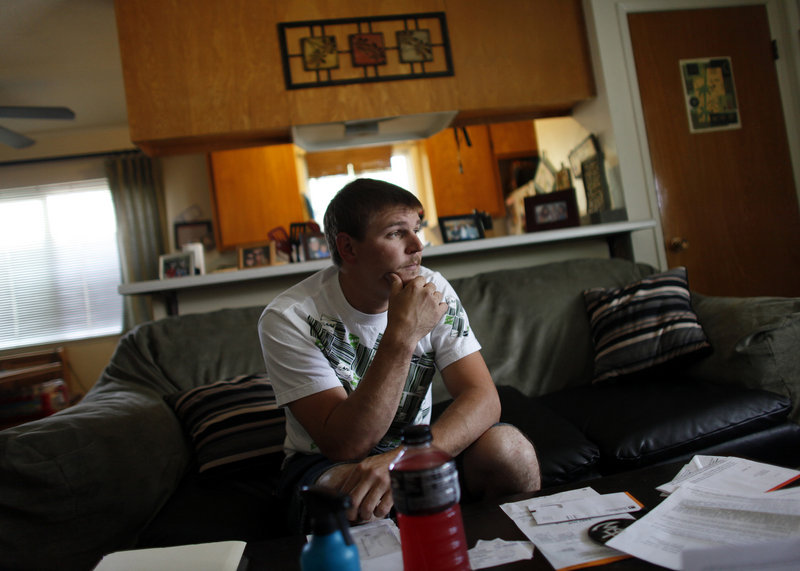SAN JOSE, Calif. – Millions of homeowners are trapped in a bizarre real estate limbo, living in houses but no longer paying for them, waiting and wondering if someone will help them — or throw them out.
Some are victims of their own economic circumstances, unable to afford their mortgage and expecting to lose their homes if they can’t get a break from their bank. Others are opportunists, choosing not to spend on a house worth less than they owe. Instead, they can live rent-free until their lender makes a move.
The limbo phenomenon is a radical departure from previous real estate crashes, when there were far fewer troubled loans and banks moved speedily on those who fell behind on payments. Now many lenders simply can’t keep up, and others appear reluctant to flood a weakened market with foreclosed homes.
It all adds up to lingering instability for the housing market, as lenders slowly work through the backlog while homeowners endure uncertainty that could last months or even years.
“It’s bad for the neighbor, the community, the city, state, nation,” said Chris George, CEO of CMG Mortgage, based in San Ramon, Calif. “It’s a continued indication that there are a lot of people in trouble, particularly with their job situations.”
Some homeowners say ignoring the mortgage is their only option.
“I stopped paying payments about 12 months ago,” said Jeff Dunkin, 25, a construction worker who has twice sought to modify the loan on his San Jose condo, and twice been denied.
He’s worked only sporadically since early 2009, and the unemployment checks he’s collected are less than half what he used to make. He knows some people may think living mortgage-free sounds like a cushy deal. But that’s not how it feels to him.
“It’s a lot of anxiety, a lot of stress,” Dunkin said.
He has lots of company. An estimated 40,283 homeowners across a seven-county region in the San Francisco Bay Area were at least three months behind on their mortgages, but not yet in foreclosure, as of April, according to CoreLogic, which tracks mortgage performance data. That’s about 4.5 percent of total mortgages in that area, and a drastic increase from 0.25 percent in January 2007.
Nationwide, “roughly 3.5 million loans are in this limbo land, and are not proceeding through very quickly. It could take years,” said Sam Khater, an economist with CoreLogic, which tracks mortgage performance.
“We have all these people who are really kind of on the edge,” said Kevin Stein, associate director of the California Reinvestment Coalition, which fights for homeowners seeking loan modifications.
“They’re anxious because they know they’re behind, and they know all these foreclosures are happening, and they know they could be next.”
Dunkin, for example, bought his two-bedroom condo in 2007 for $355,000. His fiancee and a roommate helped pay the mortgage. But in early 2009 the engagement crumbled, and construction work in the area dried up.
As he scrimped to make his $2,486 monthly mortgage payments, he let his condo association dues lapse, and the association sued him for the overdue amount. He spent months paying it but let his mortgage slide.
Dunkin has yet to receive a notice of default, but he did receive letters this spring from his lender about the possibility of a short sale — selling the condo for less than he owes.
“I have not responded to that,” he said. For now, he’s saving money so he can rent a place after foreclosure, which he considers nearly inevitable.
Part of the reason homeowners wind up staying in their homes so long lies with the lending industry, Stein said.
Many companies are overloaded with people who are behind in payments, and financial institutions are hesitant to process thousands of foreclosures at once, because dumping all those properties on the market would lower prices even more.
Khater said many lenders are moving slowly because they hope the government will eventually step up to help cover their losses. They also may be hoping an economic recovery will allow many borrowers to catch up with their payments, but “they’re going to be waiting a while,” he said.
Send questions/comments to the editors.



Success. Please wait for the page to reload. If the page does not reload within 5 seconds, please refresh the page.
Enter your email and password to access comments.
Hi, to comment on stories you must . This profile is in addition to your subscription and website login.
Already have a commenting profile? .
Invalid username/password.
Please check your email to confirm and complete your registration.
Only subscribers are eligible to post comments. Please subscribe or login first for digital access. Here’s why.
Use the form below to reset your password. When you've submitted your account email, we will send an email with a reset code.